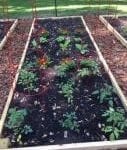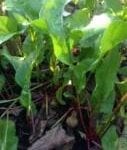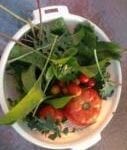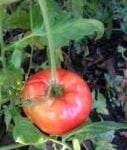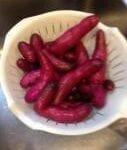Written by Thu Tran, MD,FACOG
September 22, 2015
In late spring, my husband David and I and some friends from our Lady Docs Corner Cafe group started funding a project for the William Penn House, a wonderful Quaker organization in Southeast Washington D.C., to plant garden boxes for some families in the areas. Inner city residents in Washington D.C. have a big problems getting vegetables. There are no large grocery stores, no Costco, no giant Asian markets where simple vegetables such as lettuce or tomatoes cost a fraction of what these residents have to pay in their local neighborhood stores. Vegetables in the neighborhood stores are often not even fresh. We understood the word “Food Justice” after watching a wonderful documentary “Growing Cities,” and decided it was time to plant a seed of community gardening in Southeast Washington D.C. The project became an instant hit, starting with twelve families as we planned but ending up with more than fifty families receiving garden boxes which they care for themselves.
To experience what the families in this community garden project went through this summer with their garden boxes, we had a vegetable garden installed in our backyard. The gentleman who created a garden for us put down seeds and plants of some of my favorite vegetables: kale, spinach, arugula, snap peas, eggplants, tomatoes, sweet tomatoes, beets and green beans. He built three mounds of organic soil to plant three vines of cantaloupes. He instructed us how often to water, to weed, to pinch off the extra branches on the tomato plants to make them more healthy. He put a fence around the vegetable garden to avoid rabbits and squirrels, and planted marigolds in between the vegetables to avoid insects and slugs. It was fascinating to see how farmers know so much about planting vegetables. They are the doctors of the garden.
The first time I harvested my snap peas, I was so excited. Several of my friends were over for bootcamp and each of us got one snap pea. We all thought they were so sweet. I gingerly took a small bag of sorrels mixed with some wasabi arugula to my next door neighbor’s, who laughingly reminded me how many vegetables I would have been able to buy with the money we paid the gentleman to put in the garden, all organic vegetables, for the rest of the year!
The spinach never grew, and the beets, after three months under the ground, were the size of my thumb. The arugula looked like the miniature version of those in the grocery stores, and we got three cantaloupes the size of softballs before the vines died off. The eggplants were delicious, although it took five eggplants to give me enough to serve a meal for the three of us. Only the green beans and tomatoes looked “normal” and tasted marvelous, although I didn’t have time to pinch off the offshoots, causing the tomato plants to be taller than me. We haven’t dug up the sweet potatoes yet. My friends told me to wait until their leaves turn brown, giving them enough time to get bigger.
For all the time we tended to our garden, I could have run a few more miles each week or read a few more books this summer. I wouldn’t have had to wear my wide rim hat, long jeans and long sleeve shirts in the heat of summer to avoid the gnats and other insects which swirled around me whenever I watered or weeded the garden. The slugs were so smart that they hung on the beet leaves and stayed away from the marigolds. I got so many bug bites I looked like someone living on a camp ground.
Yet I love that vegetable garden. I love gathering the sorrels and arugula into the basket full of cherry tomatoes and beans. I didn’t have enough of each type of vegetable so I mixed them all up for my salad. They were the fruits of our labor, as if I was guiding a child into adulthood, keeping him away from the hidden dangers around him, like the clover sneaking up in between the arugula bundles. Weeding is an act of meditation or yoga, purposeful and mindful, with precision, all amongst sounds of insects and birds. Planting, tending and harvesting my own vegetables gave me a sense of control in my quest for healthy living. I know I didn’t use pesticides in my garden. I know I didn’t use chemical fertilizers on my vegetables. I know what I eat.
What else could serve more as a mirror of our life than a vegetable garden, where vegetables live in groups, and groups in a community where one might lean on the other, like the eggplants on the tomato branches, or rows of marigolds between the vegetables, like guards and soldiers surrounding a fort? The sweet potato plants, like teenagers, seem to be oblivious to the rest of the garden, with leaves wandering in multiple directions, knowing nobody will bother them until autumn.
As in the process of aging, no matter how much sun my vegetable garden has, no matter how much water or how often I water, how much time I spend weeding, certain vegetables will wither at certain times of the summer. My friends told me with precision when the snap pea season would be over, and how beets are supposed to emerge from the ground after forty something days. Everything, like humans, have a finite life. No matter how much exercise we do, how little fat and sugar we consume, how long we sleep at night, our body will continue to wither with time. I know immortality doesn’t exist in my garden, as I watch the last green leaf turning brown on the last vine of the snap peas.
In a few months, my first garden will be vanishing. Left behind will be the brown dirt eventually covered by snow flakes. Like the world of mortals, however, young lives will come amid the spring. Seedlings will peek through the earth, showing their coats of a vibrant life. Watching my garden withering in the fall is like watching a sunset. After a transient darkness, the sun will rise again. During that time, I will have a break from gardening and catch up with my running and books.
Who would have thought gardening taught me so much about life? Beside the growing respect for farmers for their patience and knowledge, I realized they might be the last crop of Henry Thoreau in modern society. Maybe next year, you should have a vegetable garden. Plant your favorite vegetables, watch their cycle of life in front of you, and respect how ordered the world is, the relationship between the sun, the water, the earth, and all its inhabitants.
Tags:



